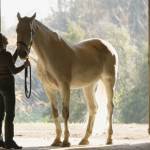Weight Loss in Older Horses: Management Solutions

Older horses don’t have to become underweight horses. If senior equines begin to lose weight, there is usually a reason for the change such as dental inadequacy, gastrointestinal inefficiency, immune dysfunction, or the stresses associated with pain.
If a horse drops weight on a diet that once kept it in moderate body condition, there is likely to be an underlying medical condition. To uncover such a problem, a thorough veterinary examination should be scheduled. Most veterinarians that are presented with cases such as this will evaluate liver and kidney function.
Senior horses that have difficulty maintaining weight often have dental problems. Regular floating and other maintenance by a qualified individual might keep some of those problems at bay, but for senior horses, one of the primary issues is tooth loss. Don’t assume the horse has a functional mouth if you simply pull back his lips and find a full set of incisors. These front teeth are usually the last ones lost by aged horses.
The cheek teeth or molars, those found further back in the mouth, are the ones that affect the digestive capability of the horse. Because they are used to grind feed into small particles, they are essential in the digestive process. Inability to properly chew feeds might cause inefficient digestion in the gastrointestinal tract. The lifespan of these teeth is usually 20 to 25 years. By the time the horse reaches this age, there is a real possibility of some molars loosening and falling out.
If tooth loss is determined to be the cause of declining body condition, steps can be taken to ensure the horse is properly nourished. Horsemen often use processed complete feeds to nourish horses. Complete feeds are those that can be fed as the sole ration, and are usually composed of an energy-rich roughage base (dehydrated alfalfa meal and/or dehydrated beet pulp, for instance) with energy, protein, and mineral-vitamin supplements added. The cereal grains in complete feeds are often heat-treated, which increases the digestibility of nutrients.
Another alternative for horses with poor dentition is chopped hay. Chopping hay significantly reduces the amount of chewing necessary by the horse. Chopped hay should be premium quality, with alfalfa or a mixture of high-quality grass hay and alfalfa probably the best choices. If chopped hay is fed, a vitamin-mineral supplement should be offered. These supplements often come in the form of a pellet and can be moistened to increase palatability.
Some horsemen find that aged horses do well on alfalfa hay. While they are probably going to be unable to chew the stems, many horses with compromised dentition will shake or move the hay so that the leaves, which are the most nutritious part of the plant, fall off the stems and can be picked up.
Horses that require still further calories to maintain weight can be fed fat in the form of vegetable oil, rice bran, or a fat supplement. Oil can be mixed into a complete feed or used to soften the pellets previously mentioned. Up to two cups of vegetable oil can be given in one day, though small amounts should be offered initially.
Absorption of nutrients might also be a factor in weight loss. Without question, older horses were less efficient at processing their meals decades ago. This situation changed with the advent of more specialized and efficient deworming protocols, and today researchers see little difference in nutrient absorption between young and old horses. In some horses, however, nutrient absorption might decrease slightly as years pass.
Generally, as hard-keeping seniors age, their energy requirements increase. The solution becomes simple: add more calories to the ration. Forages recommended for these horses include high-quality timothy, grass mixes, or a grass-alfalfa mix (no more than 50% alfalfa). Well-fortified feeds made especially for seniors are also suggested, as they often contain energy sources that are easily fermented in the hindgut. Older horses might do better on multiple small meals a day instead of two larger ones. Ideally, each meal should contain no more than four pounds of concentrate.








